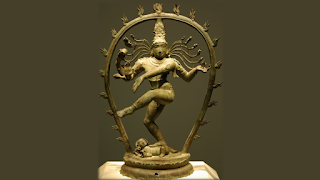Reinforcement by Dharmaśāstra
The texts of Dharmaśāstra too laid emphasis on the pursuit of the various arts. To cite one : "One who knows the essential principle (tattva) of playing on the lute (vīṇā) attains salvation," asserts Sage Yājñavalkya (3rd Century CE?). Yājñavalkyasmṛti 3.4.115:
vīṇāvādana-tattvajñaḥ śruti-jāti-viśāradaḥ |
tālajñaścā'prayāsena mokṣa-mārgaṁ niyacchati ||
वीणावादन-तत्त्वज्ञः श्रुति-जाति-विशारदः |
तालज्ञश्चाऽप्रयासेन मोक्ष-मार्गं नियच्छति ||
The commentator, Vijñāneśvara (12th Century CE), gives the logic behind this understanding in his Mitākṣarā pithily thus: the mind is then centred in the Self. Mitākṣarā on 3.4.115: tad-anuviddha-brahmopāsanatayātālādi-bhaṅga-bhayāc-citta-vṛtter ātmaikāgratāyāḥ sukaratvād alpāyāsenaiva mukti-pathaṁ niyacchati ||
तद्-अनुविद्ध-ब्रह्मोपासनतयातालादि-भङ्ग-भयाच्-चित्त-वृत्तेर् आत्मैकाग्रतायाः सुकरत्वाद् अल्पायासेनैव मुक्ति-पथं नियच्छति ||
In the previous verse it was stated that singing liberates.
Yājñavalkyasmṛti 3.4.114: geyam etat tad-abhyāsa-karaṇān-mokṣa-saṁjñitam|
गेयम् एतत् तद्-अभ्यास-करणान्-मोक्ष-संज्ञितम्|
The commentary Mitākṣarā says that the means for salvation has also been referred to, by an extension of sense, by the word salvation – representing, that is, the means and the end by the same word. (This process is technically called upacāra wherein two unequal but related things get to have the same appellation.) The sage goes on to aver that if salvation itself does not accrue from the above means (possibly owing to any shortcomings), the singer would not stand to lose, but on the other hand, be conferred the status (no small one, verily) of becoming an attendant upon the very Lord Śiva! – the next best thing, as it were. Read Yājñavalkyasmṛti 3.4.116:
gītajño yadi yogena nā''pnoti paramaṁ padam |
rudrasyā'nucaro bhūtvā tenaiva saha modate ||
गीतज्ञो यदि योगेन नाऽऽप्नोति परमं पदम् |
रुद्रस्याऽनुचरो भूत्वा तेनैव सह मोदते ||
It may be recalled that Kālidāsa calls the art of the stage a veritable "delectable Ocular Sacrifice" (Mālavikāgnimitra 1.4: kāntaṁ kratuṁ cākṣuṣam |) – as against the regular sacrifices which demand multiple actions involving complex procedures, all to be done meticulously, and there being nothing quite enjoyable therein apparently. Dance and music – as conceived in India, that is – confer the supreme benefit not only upon the performer but also the connoisseur audience. This is the reason behind addressing the art of the stage as ocular (cākṣuṣa), which can only pertain to the audience.
